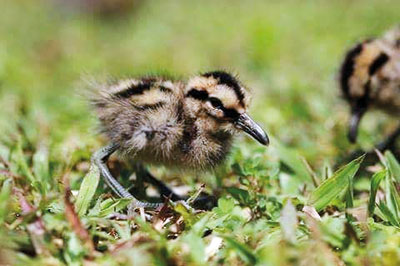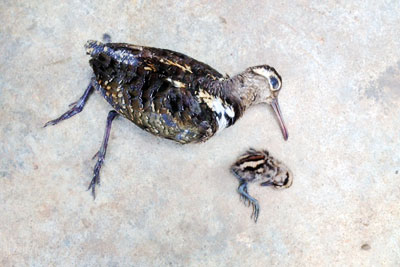News
Time ticks by for tragic painted-snipe chicks

Wild and free – time in the outdoors for the orphaned chicks.
Many tragedies that Sri Lanka’s precious wild creatures face do not often make the news, unlike human road traffic fatalities. Heart-warming tales of survival are rarer still.
While a road traffic accident last week claimed the lives of 12 innocents, including 10 from the same family in northern Chavakachcheri, two new-born greater painted-snipe chicks became survivors of an accident where the father and a newborn perished – yet another reason that drivers should not become assassins.
The Wildlife Conservation Department’s Hikkaduwa office handed over the two chicks to the Wildlife Conservation Society of Galle and they are now being cared at the Hiyare animal hospital, which has a rescue and rehabilitation program.
WCSG president Madura de Silva suspects that the chicks would have hatched a few days earlier. Volunteers at the animal hospital have fed the chicks with worms and the response has been good after initial difficulties. Painted-snipes usually feed on insects, worms, crustaceans, molluscs and seeds.
Volunteers have also gradually introduced the chicks to the outdoors.
“Their chances of survival are not high, but we are trying our best to save them,” de Silva said. “If they can get through the critical period, then we will try our best to rehabilitate them with an aim of releasing them.’’ The chicks could be introduced to the care of a domesticated ground-dwelling bird such as a hen, so that the orphans can pick up survival skills.
The greater painted-snipe (rostratula benghalensis) have long beaks. They are a brightly-coloured ‘snipe’ like bird. Painted-snipe inhabit swamps, marshes and even undisturbed sections of paddy fields. They are more active at night. Chicks are buff coloured and have black stripes running along their body length. The coloration helps keep them camouflaged.
In parenting, the female, which is more colourful and larger, nurtures the chicks, but the male also shares responsibilities such as helping to incubate the eggs, experts say. The female is known to initiate courtship and may also mate with more than one male.

A volunteer feeds an orphaned painted-snipe chick. Pix by Wildlife Conservation Society of Galle

The unlucky painted snipe male and a chick

